|
Heading
East-Many interviews were conducted to help research the Heading
East exhibit. Here you can find excerpts of interviews with
key Asian Americans.Dr.Sammy Lee
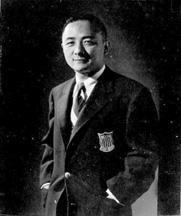
Biography:
Born in Fresno in 1920 to Korean immigrants who worked on
a Hawaiian plantation. Dr. Lee was the first Asian American
to win an Olympic gold medal. He was awarded the gold medal
for the 10-meter platform at the 1948 Olympic games in London.
Four years later, he went on to win the gold in the 10-meter
and the bronze in the 3-meter springboard in the Helsinki
Olympics.
His accomplishments were not limited
to the athletic field. Dr. Lee was a student-athlete at the
University of Southern California School of Medicine, where
he received his M.D. in 1947. He went on to serve in the U.S.
Army Medical Corps in Korea from 1943-45, where he specialized
in the diseases of the ear. In 1953, while serving his tour
of duty in Korea, he learned that he received the James E.
Sullivan Trophy, which is given to the outstanding American
athlete of the year.
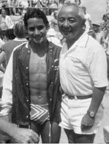
In 1968 Dr. Lee was elected to the
International Swimming Hall of Fame, followed by his induction
into the U.S. Olympic Hall of Fame in 1990. His many other
achievements include: serving as a member of the President's
Council on Physical Fitness and Sports from 1971-80 and coaching
the U.S. diving team for the 1960 and '64 Olympics. During
the 1976 Montreal Olympics, he coached Greg Louganis, who
won a silver medal in the 10-meter platform.
Dr. Lee talks about the
Olympic Dream: Many years ago -- fifty-six years ago -- I first got the Olympic
Dream when they had it here in Los Angeles in 1932. And, I
used to go to the produce market on San Pedro Street in Los
Angeles. When we came through that tunnel that used to be
the Broadway Tunnel, coming into the great metropolis of Los
Angeles, all these flags of various countries were on it.
And, I asked my father, "What are all these flags? He
said, "They're having the Olympic games."And, I
said, "Well, what is that?" He said, "That's
where they crown the greatest athletes in the world."
And, I'll never forget the chill that went up and down my
spine. I said, "Papa, someday I'm going to be an Olympic
champ." And, he chuckled and said, "What in?"
I said, "I don't know, but I'll find it."
So, that summer -- playing follow the
leader and challenging my peers -- they couldn't do what I
was doing. All day long I was doing front somersaults and
back somersaults, and an African American kid by the name
of Hart Crumb standing by the pool said, "Hey, Sammy
why do you do only one somersault?" I said, "I don't
know how to do any more." He said, "Well, I'll tell
you what. I'll bounce the board, and when I yell, you come
out."
So, he taught me how to do a forward
one-half somersault. I was so thrilled I ran home and I told
my dad, "Papa, I found the sport I'm going to be an Olympic
champ in... diving!" He didn't know what that was, but
I said, "Well, you have to come out to the pool to see
what diving is all about." And, I guess he must have
seen the eagerness in my eyes, and he said, "Son, I'll
back you all the way, but you have to promise me you have
to study as much as you're going to be diving." And,
I've been very fortunate to have been able to fulfill all
of my Olympic Dreams plus my professional dreams.
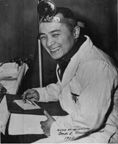 Dr. Lee's views on academics and
sports: I had always admired
the athlete. I never admired the brightest student -- it did
not impress me whatsoever. But the fellow who could fight
the best or who was the fastest runner -- that's the one I
admired. And, I wanted to be a part of that admiration from
my classmates, and that's why I went into diving so thoroughly.
But, it was my father who said, "Remember to exercise
your mind as well as your body," and I had to goals in
life: one, to become a doctor of medicine, and second, to
be an Olympic champion. And, as the war came along in 1940,
41 I had already started my pre-med school and had become
a doctor of medicine by the time the 1948 Olympics came around. Dr. Lee's views on academics and
sports: I had always admired
the athlete. I never admired the brightest student -- it did
not impress me whatsoever. But the fellow who could fight
the best or who was the fastest runner -- that's the one I
admired. And, I wanted to be a part of that admiration from
my classmates, and that's why I went into diving so thoroughly.
But, it was my father who said, "Remember to exercise
your mind as well as your body," and I had to goals in
life: one, to become a doctor of medicine, and second, to
be an Olympic champion. And, as the war came along in 1940,
41 I had already started my pre-med school and had become
a doctor of medicine by the time the 1948 Olympics came around.
On how it felt to represent America as a Korean American::
Well, first, I wanted to show my fellow Americans that we,
Koreans, had a place in American society. My immediate friends
knew what a Korean was because they knew me, but leaving my
own vicinity of Highland Park, California -- other people
didn't know what a Korean was.
They said, "You were Japanese, Chinese." And, I
said, "Well, that's an entirely separate civilization.
They had their own language which I cannot speak, but we are
a separate entity." So, when I did get to represent the
United States, I was the only Asian American to be on the
U.S. Olympic team in swimming and diving. When I won the gold
medal then in 1948 -- I'd won the bronze medal the week before
on the 3 meter springboard -- I felt that this was the first
time that an Asian American was in the mainstream of the American
sporting picture.
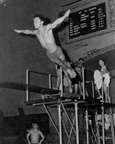 Training to become a diver early
in his career: A coach named
James Frederick Ryan, six-foot four inch, two hundred seventy-five
pound Irish American said, "In order for you guys to
really learn how to dive, you're going to have to come to
my home. We're going to build a sand pit." I said, "What's
that? He says, "I'll buy the diving board, and I'll buy
the equipment, but you guys have got to dig the sand pit.
And,I'll buy a ton of sand." Training to become a diver early
in his career: A coach named
James Frederick Ryan, six-foot four inch, two hundred seventy-five
pound Irish American said, "In order for you guys to
really learn how to dive, you're going to have to come to
my home. We're going to build a sand pit." I said, "What's
that? He says, "I'll buy the diving board, and I'll buy
the equipment, but you guys have got to dig the sand pit.
And,I'll buy a ton of sand."
So, that winter [my friend and diving
partner] Dick and I dug a hole. And, he brought the diving
board, we mixed the cement, and be put the board one meter
up. On the first day of practice, he said, "Now you're
going to do front somersaults. Then you are going to do two
somersaults." And, I thought, "Oh, brother. Two
somersaults? The sand is level with the springboard, if not
higher." He says, "Well, are you going to catch
it if you don't make it? If you're dumb enough not to make
it, you deserve to die." And, so that's the way we trained
and, by golly, when we had to do double somersaults, we went
for the somersault, in fear of hurting yourself. Fortunately,
we didn't. And, that's how we trained. I trained there seven
days a week while I was going through high school -- rain
or shine, I was there.
Overcoming his doubters: I was running for student
body president at Franklin High School. There, I was athletic
manager, head yell leader, vice-president of the student body.
Then, I wanted to be the first non-white president. So, the
vice-principal, named Fred Erickson, called me in and says,
"You know, this high school has never had a non-white president.
And, I would advise you not to run because: one, you didnt
play football, and, well, don't break your heart. Forget it."
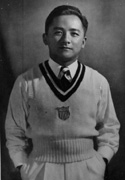 Overcoming his doubters
I was running for student body president at Franklin High
School. There, I was athletic manager, head yell leader, vice-president
of the student body. Then, I wanted to be the first non-white
president. So, the vice-principal, named Fred Erickson, called
me in and says, "You know, this high school has never
had a non-white president. And, I would advise you not to
run because: one, you didnt play football, and, well, don't
break your heart. Forget it." Overcoming his doubters
I was running for student body president at Franklin High
School. There, I was athletic manager, head yell leader, vice-president
of the student body. Then, I wanted to be the first non-white
president. So, the vice-principal, named Fred Erickson, called
me in and says, "You know, this high school has never
had a non-white president. And, I would advise you not to
run because: one, you didnt play football, and, well, don't
break your heart. Forget it."
The racial tension during the '40s: After Pearl Harbor, in the old days, we used to wear a big
button: it had a Korean and an American flag and it said,
"I'm a Korean, not a Jap." Now, I used to wear this
button in 1942, when I was going back to the National Championships.
I happened to get on this troop train -- part of the train
was for passengers and the other for troops. And, I was walking
through to go to the dinig room, and I bumped in to a couple
of the Japanese Americans that were on the Hawaiian swim team.
And, they said, "Hey, Sam! How are you?"
I had this button on, and they looked at the button, and I
said, "I'm really embarrassed that I have this button
on." They said, "Aw, Sam. We understand. Don't worry
about it." But, I took the button off, and never wore
it again. I used to get stopped in the streets of Los Angeles,
and people would say,"Hey, you Jap! What are you doing
on the streets?"I said, "I'm not a Jap. I'm Korean."
And, at that time, my attitude towards Japanese had changed.
Prior to that
time, as Koreans, we were taken at four or five years old
to the demonstration of Japanese: what the Japanese did to
the Koreans, killing ten throusand, maiming so many thousands
when they asked for independence.
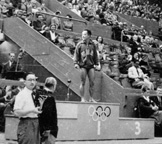 His feeling on winning the gold medal in the 10 meter
platform in the 1948 Olympics: His feeling on winning the gold medal in the 10 meter
platform in the 1948 Olympics:
How did I feel on my last dive? The forward three and a half
somersault that I put in the book? Some 8 years before, that's
what I thought of. Here is my baby, the forward three and
a half somersault. And, if I come out backwards, I cannot
go through another four years in trying to make the Olympic
team. Sixteen years for this particular moment. All I could
hear was the trickle of the water. I damn near fainted. And,
all I remember was the sound of the tower. When I hit that
water, it was tingling, like in the way you get slapped in
the face.
When I broke the surface of the water and looked, I saw 10,
9, 9.5, 7, 9. I realized I was Olympic champion. And that
was the second time in history a man walked on water when
I went over to get my gold medal. And, I remember when I was
up there in the stands. During the raising of the flag, the
Star Spangled banner never sounded so beautiful. The red,
white, and bllue of the flag was never so red, white, and
blue. I thought I was dreaming. I thought I was listening
to Jesse Owens' victory in 1936 when I sat glued to the radio
and listened to Jesse Owens' victory. "It must be by
the radio," I thought. "No, no, it's happening to
me. I'm actually Olympic champion!"
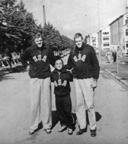
|